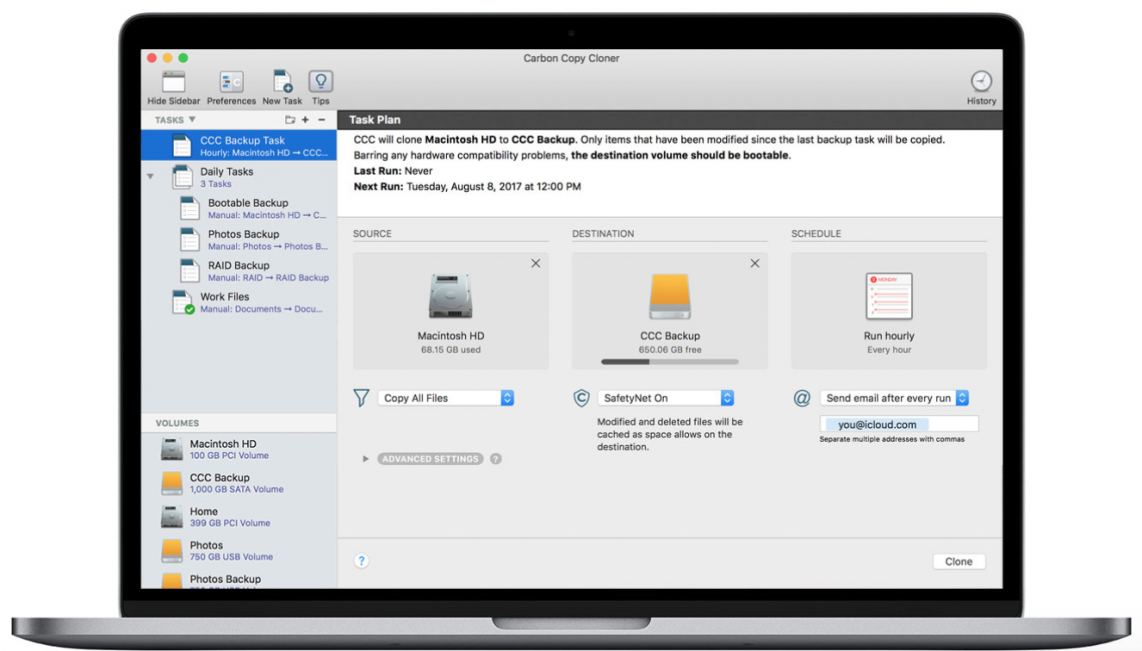

- CARBON COPY CLONER 3.1 BACKUP UTILITY UPDATE
- CARBON COPY CLONER 3.1 BACKUP UTILITY SOFTWARE
- CARBON COPY CLONER 3.1 BACKUP UTILITY MAC
VolumeIcon.icns is unresolvable for any volume that is not the current startup disk. That's not the case for external volumes, those Data volumes are mounted at /Volumes/CCC Backup - Data (for example). For the current startup disk, this path resolves correctly because the Data member of the volume group is mounted at /System/Volumes/Data. To keep the System volume read-only, yet allow the apparent modification of this icon file, Apple chose to create a symbolic link at the root of the startup disk that points to System/Volumes/Data/.VolumeIcon.icns. Up to macOS Catalina, the custom volume icon is stored in a file at the root of the startup disk named ".VolumeIcon.icns". This problem is the result of a design flaw in the implementation of custom icons in an APFS volume group. This problem is not specific to CCC backups, but we see this frequently because CCC creates bootable backups.
CARBON COPY CLONER 3.1 BACKUP UTILITY MAC
Finder will not show, nor allow you to set custom icons on other Catalina and Big Sur startup disksįinder will show and allow you to customize the volume icon for your current startup disk, but not for other Catalina- or Big Sur-bearing startup disks that your Mac is not currently booted from. Workaround: If you need to recover your Apple Silicon Mac from a backup, we recommend that you reinstall macOS and then migrate data from your CCC backup using Migration Assistant. We have reported this issue to Apple (FB9055615) and we are currently awaiting a response. In the current shipping version of macOS Big Sur (11.3.1, and 11.4 Beta 3), Apple's ASR utility can copy from the Apple Fabric storage in an Apple Silicon Mac, but it causes a kernel panic when cloning to Apple Fabric storage.
CARBON COPY CLONER 3.1 BACKUP UTILITY SOFTWARE
Apple Software Restore causes a kernel panic when cloning to the storage in Apple Silicon Macs

You could apply updates before attempting to restore from the backup, for example, if that need ever arises. This is not something that we anticipate you would need to do frequently, nor even proactively.
CARBON COPY CLONER 3.1 BACKUP UTILITY UPDATE
If you would like to update the OS on the backup volume, you can boot your Mac from the backup and apply any updates via the Software Update preference pane in the System Preferences application. CCC can then use its own file copier to maintain the backup of your user data, applications, and system settings. Our recommendation: We recommend erasing the destination only for the purpose of establishing the initial bootable backup. Apple's APFS team acknowledged the request in June 2020 and clarified the requirements, and now we're waiting on the implementation. We made a feature request to Apple in September 2019 (FB7328230) to allow ASR to clone just the System volume. To avoid deleting your snapshots and the rest of your backup, CCC will not update the System volume on the destination when System updates are applied to the source. As a result, every time an OS update is applied to the source, we would have to erase the whole destination volume ( including any existing snapshots on that volume) just to update the system on the destination. Right now, ASR will only copy whole volume groups (System and Data), we can't choose to clone just the System volume. That volume can only be copied using Apple's proprietary APFS replication utility ("ASR"). Starting in macOS Big Sur, the system now resides on a cryptographically sealed "Signed System Volume". CCC will not update the System volume on a Big Sur bootable backup if you want the Mac to always boot from the cloned volume). When your Mac has completed booting, you can optionally choose to set the startup disk to the current startup volume (i.e. Workaround: To boot from the cloned volume, restart your Mac while holding down the Option key (Intel Macs) or the Power button (Apple Silicon Macs), then select the cloned volume in the Startup Manager. We have reported this issue to Apple (FB8889774) and we are currently awaiting a response. Some Big Sur cloned volumes do not appear in the Startup Disk Preference Pane, despite being perfectly bootable. In the past, the Startup Disk Preference Pane would list all available startup volumes, including volumes cloned by CCC (whether CCC used ASR or its own file copier). Some Big Sur startup volumes don't appear in the Startup Disk Preference Pane


 0 kommentar(er)
0 kommentar(er)
